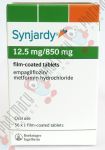People also ask
What is Synjardy?
Synjardy contains two active ingredients: empagliflozin and metformin. Both belong to a group of medicines called "oral antidiabetics". These medications are taken by mouth to treat type 2 diabetes.
How does it work?
Synjardy combines two hypoglycemic drugs with complementary mechanisms of action to improve glycemic control in patients with type 2 diabetes: empagliflozin, a sodium-glucose cotransporter type 2 inhibitor (SGLT2), and metformin hydrochloride, a member of the class of the biguanides.
Empagliflozin
Empagliflozin is a highly potent selective and reversible competitive inhibitor (IC50 of 1.3 nmol) of the sodium-glucose type 2 cotransporter (SGLT2). Empagliflozin does not inhibit other glucose transporters important for the transport of glucose to peripheral tissues and is 5,000 times more selective for SGLT2 than for SGLT1, the most important transporter responsible for the absorption of glucose in the intestine. SGLT2 is highly expressed in the kidney, while expression in other tissues is non-existent or very low. It is responsible, as the predominant transporter, for the reabsorption of glucose after glomerular filtration to return it to the circulation. In patients with type 2 diabetes and hyperglycemia, a larger amount of glucose is filtered and reabsorbed.
Metformin
Metformin is a biguanide with antihyperglycemic effects than both basal and postprandial plasma glucose. It does not stimulate the secretion of insulin and, therefore, does not cause hypoglycemia.
Metformin can act by 3 mechanisms: decreased hepatic glucose production by inhibiting gluconeogenesis and glycogenolysis, in the muscle, increasing insulin sensitivity, improving peripheral glucose uptake and utilization, and delaying the intestinal absorption of glucose.
What are the benefits of taking it?
Synjardy is added to diet and exercise to treat type 2 diabetes in adult patients (18 years of age or older) that cannot be controlled by adding metformin alone or metformin with other medicinal products for the treatment of diabetes. Synjardy uses also include being combined with other medicines for the treatment of diabetes. These may be drugs given by mouth or given by injection, such as insulin. In addition, Synjardy can be used as an alternative to taking empagliflozin and metformin as separate tablets. To avoid an overdose, do not continue to take the separate empagliflozin and metformin tablets if you are taking this medicine. It is important that you follow the diet and exercise plan that your doctor, pharmacist or nurse has told you.
How do I use it and its dosage?
Always use this Synjardy diabetes medication exactly as your doctor has told you. If in doubt, consult your doctor or pharmacist again.
How much to take
Synjardy dosage varies depending on your condition and the doses of diabetes medications you are currently taking. Your doctor will adjust the dose as necessary and will tell you exactly what concentration of the medicine to take.
The recommended Synjardy dosage is one tablet twice a day. Typically, your doctor will start Synjardy treatment by prescribing the tablet strength that provides the same dose of metformin that you are already taking (850 mg or 1,000 mg twice daily), and the lowest dose of empagliflozin (5 mg twice daily). day). If you are already taking the two medicines separately, your doctor will start treatment with Synjardy tablets that provide the same amount of both. If you have reduced kidney function, your doctor may prescribe a lower dose.
Taking this medicine
Swallow the tablet whole with water. Take the tablets with food to reduce the chance of stomach discomfort. Take the tablet twice daily by mouth.
Your doctor may prescribe Synjardy together with another diabetes medicine. Remember to take all medications as directed by your doctor to get the best results for your health. Your doctor may need to adjust your doses to monitor your blood glucose levels.
Proper diet and exercise help your body make better use of your blood glucose. It is important to follow the diet and exercise plan recommended by your doctor while taking Synjardy.
Side effects & precautions
Like all medicines, this medicine can cause side effects, although not everybody gets them.
Contact a doctor or the nearest hospital immediately if you have any of the following side effects:
Severe allergic reactions have been observed with an unknown frequency (frequency cannot be estimated from the available data)
Possible signs of a severe allergic reaction may include:
- swelling of the face, lips, mouth, tongue, or throat, which may cause difficulty breathing or swallowing)
Lactic acidosis has been observed very rarely (may affect up to 1 in 10,000 people)
Synjardy can cause a very rare but very serious side effect, called lactic acidosis. If this happens to you, you should stop taking Synjardy and contact a doctor or the nearest hospital immediately, as lactic acidosis can lead to a coma.
Diabetic ketoacidosis has been observed rarely (may affect up to 1 in 1,000 people)
- increased levels of "ketone bodies" in your urine or blood
- rapid weight loss
- nausea or vomiting
- stomach ache
- excessive thirst
- fast deep breathing
- confusion
- unusual drowsiness or tiredness
- sweet breath odor, sweet or metallic taste in the mouth, or a different smell in the urine or sweat.
Other side effects while taking Synjardy:
Very frequent Synjardy side effects
- feeling unwell (nausea), vomiting
- diarrhea or stomach pain
- loss of appetite
Frequent Synjardy side effects
- genital yeast infection (candidiasis)
- urinating more than normal or needing to urinate more often
- itching (pruritus)
- skin rash or redness that can be itchy and include bumps, fluid discharge, or blisters
- changes in the taste of things
- thirst
- blood tests may show increased levels of blood fats (cholesterol)
Infrequent Synjardy side effects
- hives
- straining or pain when emptying the bladder
- blood tests may show decreased kidney function (creatinine or urea)
- blood tests may show an increase in the number of red blood cells in your blood (hematocrit)
Very rare Synjardy side effects
- decreased levels of vitamin B12 in the blood
- abnormal liver function tests, inflammation of the liver (hepatitis)
- redness of the skin (erythema)
Frequency not known
necrotizing fasciitis of the perineum or Fournier's gangrene, a serious infection of the soft tissues of the genitals, or the area between the genitals and the anus.
Buying online.
You can buy Synjardy tablets online through one of the UK’s leading online pharmacies, Pharmacy Planet. It's easy and convenient. You will need to fill out a short assessment and the item will be delivered directly to your door. If you want to buy this Diabetes treatment medication online, use Pharmacy Planet, a UK pharmacy you can trust.














